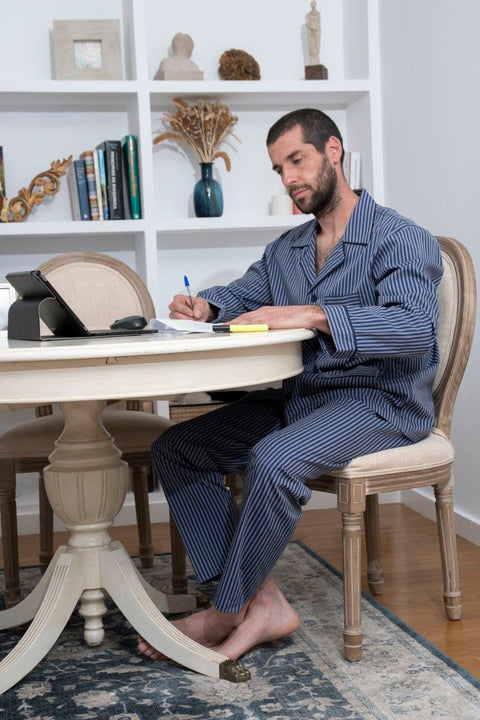Some claim that the best remedy for mental, physical, and emotional health is sleep. Those who sleep late are labeled as lazy and sluggish. The best companion for these hours that should be sacred must always be the pijama. But why is this stigma not good and what effects does sleep have on daily life?
At first glance, the topic of sleep does not seem particularly fascinating. Especially when there is no serious problem with it. It only becomes interesting when it is discovered that to this day, it is not really known why one must sleep for certain periods compulsorily.
Humans are the only species that deliberately allows themselves to sleep little because they believe it is not something “so necessary” and it is a topic that should not be given much importance. By nature, humans are ambitious, plan a lot every day, and when they need more time, it is at the expense of sleep, and in an irresponsible way, a recklessness is committed. It is a topic that must be worked on more seriously. The use of pijama, is an element to be taken into account to encourage sleep.
Need and Quality of Sleep
On average, a different amount of sleep is needed depending on age. A newborn baby sleeps between 14 and 20 hours, while adults can manage between 7 and 9 hours. However, each person has a different need for sleep. The quality and quantity of sleep also decrease with age, and with the absence of certain necessary environmental elements to achieve it; among others, the appropriate temperature, the condition of the mattress, and of course, the use of a pijama suitable for the occasion can be listed.
Some are night owls, others are early risers. People who get up early generally go to bed early; while night owls like to sleep more and really get going at night. You cannot choose which type to be; it is an innate condition that comes with each person. It is probably even hereditary, that condition of being a night owl. But what can be chosen is to be warm and comfortable with the favorite and occasion pijama.
These so-called chronotypes follow a certain rhythm of wakefulness and sleep. Experts explain it by saying that one can only be vulnerable a few hours each night. While night owls are still active, early risers are already sleeping, and when early risers are awake very early, night owls are still resting. A clever evolutionary trick.
Tips for Better Sleep at Night
-
The Key is Regularity
One should try to sleep and get up at the same time, even on weekends. This way, the internal clock, known as the circadian rhythm, will adjust to what is needed to immerse oneself in the phases of deep sleep. For those who have the practice, mainly on weekends, of staying up late at night and “sleeping in” in the morning, it is initially nothing more than a self-imposed social jet lag. This should be stopped for the good of the body and brain, or at least avoid living or adopting this bad habit.
-
Catching Up on Sleep: A Myth
One should avoid sleeping very little as much as possible because lost sleep cannot be recovered. Why is it so bad? Because generally, this lack of sleep is not even noticed until suddenly, the person affected by this practice falls asleep for 1-2 hours. As a result, there is a risk of suffering various types of accidents (for example, while driving a car: microsleep), which often cost lives. It is impressive that having had sleep deficiency for an average of 19 hours produces the same reaction conditions as a person under the influence of alcohol. In this regard, it is important once again to indicate the use of the pijama. It is an immense collaborator in sleep induction.
-
Light Tells the Body It Is Daytime
Who is not happy when the sun shines in the morning? Except maybe teenagers when it shines directly on their bed. Morning sunlight tells the brain that it is daytime again and that now one must be awake and alert and put the pijama aside to activate for daily activities. Therefore, one should try to absorb as much direct sunlight as possible in the morning.
-
Artificial Light Is Not a Substitute
Artificial light is weaker than natural light and therefore is not as effective in playing the role of an alarm clock. That is why one can feel tired and exhausted, even if only in the morning. At night, turning on lights, watching television, using computers or other devices is a behavior that tells the brain it is still daytime. Very little melatonin is released, a hormone that controls the wakefulness and sleep rhythm. Melatonin produces tiredness, allows good sleep, and subsequently, good sleep throughout the night and restorative rest, in collaboration with the use of the pijama preferred.
-
What Can Be Done?
In the late afternoon hours, ready to dim the natural light of the day, one should take advantage and start adjusting the body to rest; put on the pijama and not spend much time watching television. Likewise, it is better if the laptop and mobile phone are not used during that rest period.
Basically, it is recommended to put on the pijama 1 or 2 hours before going to bed and at the same time not be connected to any screen, because the brain lacks the signal of darkness. As a result, brains do not secrete enough melatonin to fall asleep or sleep deeply enough to enjoy all the health benefits.
-
Traumas Are Processed Better During Sleep.
The brain only removes tau and ß-amyloid proteins during deep sleep phases, which have been shown to be associated with dementia. What has been learned is solidified better and more effectively through sleep. The best ideas and the most creative solutions to problems that seemed unsolvable come while sleeping.
-
Good for the Body
Recovery and regeneration are better during sleep. Sleeping a lot promotes faster healing in case of illness or injury, and if it is with the use of a good pijama, even better. While sleeping, motor skills are learned and automated more quickly. Sleep helps to be fitter, faster, and to have good performance, as in first-class sports.
From a very young age, one must get used to sleeping well and with pijama. It is widely proven that this practice is beneficial for the general health of the body and mental health. At El Búho Nocturno we can help in that process of choosing the ideal pijama.

